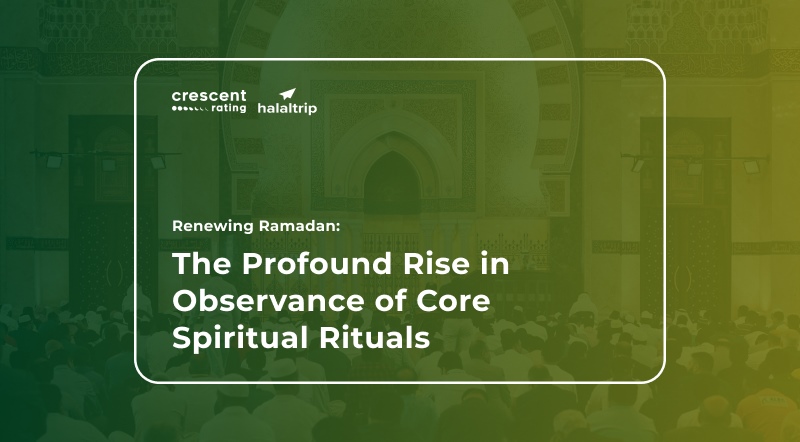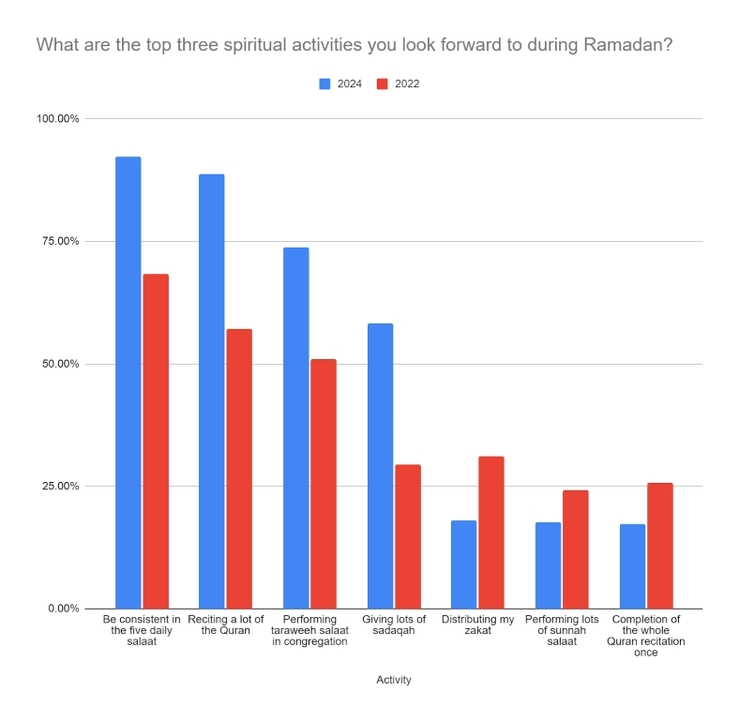
In a revealing two-year study, the Muslim community has demonstrated a profound and impactful shift towards deepening its spiritual foundations during Ramadan. The survey results from 2022 and 2024 illuminate a remarkable journey of faith, showcasing a notable increase in the effort to be consistent in the daily Salaat, an intensified engagement with the Quran, and a renewed commitment to communal and charitable practices. These findings highlight an evolving spiritual landscape and reflect a collective resurgence in the pillars of Islamic worship and the spirit of community support. As we delve into this report, we uncover the underlying dynamics of these shifts, exploring how a renewed emphasis on core religious activities is reshaping the observance of Ramadan and fostering a stronger, more cohesive Muslim community in an ever-changing world.
In the spirit of understanding and documenting the evolving spiritual practices during Ramadan, Crescentrating conducted a survey in March 2022 and then repeated it in March 2024 using the HalalTrip platform. The primary objective of this survey was to capture the top spiritual activities that Muslims most look forward to during the holy month of Ramadan. The 2022 survey was conducted just before Ramadan with more than 1100 respondents. In contrast, the 2024 survey was done during the first few days of Ramadan and had 1500 respondents. By comparing the data collected across these two periods, the aim is to uncover trends, priority shifts, and the Muslim community's overall spiritual climate during this holy month.
The selected activities for the survey included a range of religious practices, from the consistency in performing the five daily salaat to the distribution of Zakat and the completion of the Quran recitation. Respondents were asked to rank the top three spiritual activities they looked forward to during Ramadan, providing a unique insight into the Muslim community's religious priorities and personal commitments.
The analysis of the survey results from 2022 and 2024 shows a significant increase in commitment towards the top priority activities, while the priorities themselves remained almost exactly the same.
Here are the primary highlights from the survey:
These findings highlight a dynamic spiritual environment with an increased emphasis on foundational practices, communal worship, and charitable acts. The shifts observed suggest a collective reevaluation of personal and community priorities, potentially influenced by global events, societal changes, or enhanced religious education.

Substantial increases in consistency in daily Salaat and Quran recitation represent a collective turn toward Islam's core practices. This trend suggests a revival or reinforcement of fundamental spiritual disciplines, possibly responding to a perceived need for a stronger connection with faith amidst global uncertainties. The emphasis on these practices underscores the importance of personal piety and devotion, reflecting a desire among Muslims to deepen their religious observance during the holy month.
Increased Participation in Communal and Charitable Activities
The rise in participation in Taraweeh Salaat in congregation and the significant jump in giving Sadaqah indicate a growing appreciation for communal and charitable aspects of Ramadan. This shift highlights the social dimension of religious observance, where community solidarity and support for the less fortunate become central to the Ramadan experience. It reflects an understanding of Islam that extends beyond individual worship to social responsibility and community care.
While there was an increased focus on Sadaqah, the survey noted a decrease in prioritizing the distribution of Zakat. This divergence could indicate changing economic conditions or a shift in how Muslims approach financial giving during Ramadan. The increase in Sadaqah might reflect a more spontaneous or emotional response to immediate needs within the community or globally. In contrast, the decrease in Zakat distribution could suggest reassessing financial planning or the timing of these obligatory payments.
The slight fluctuations in interest in performing Sunnah Salaat and completing the Quran recitation point to a stable but nuanced engagement with these practices. While the community's focus may shift towards the more foundational aspects of worship and increased communal engagement, there remains a consistent dedication to additional forms of worship that enhance the Ramadan experience.
The shifts in priorities and practices during Ramadan reflect a community on a journey, responding to internal and external influences. Various factors may drive these changes, including technological advancements, socio-political developments, religious education, and discourse shifts. The collective turn towards more foundational practices, along with increased communal and charitable activities, suggests a broadening of the spiritual experience of Ramadan to encompass both personal devotion and social responsibility.
The comparative insights from the survey results paint a picture of a Muslim community that is dynamically engaging with its faith, adapting its practices to meet personal spiritual needs and communal obligations. The emphasis on prayer, Quranic engagement, community worship, and charity speaks to a holistic approach to Ramadan that values individual and collective growth. As these trends continue to evolve, they offer valuable perspectives on the changing contours of religious life and the diverse ways in which Muslims find meaning and fulfillment in their faith